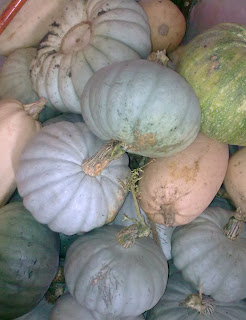Ingredient of the Month 16: Pumpkin and Pumpkin Seeds
 |
| There are many different varieties of pumpkin |
.JPG) |
| Pumpkin soup, one of the easiest and most delicious ways to eat them |
We all know those huge orange pumpkins which appear in the shops every October and end up being carved into lanterns, but there are many other types too, which are even more delicious. Baked pumpkin, pumpkin pie, pumpkin soups... these are some of the most popular ways to serve pumpkin. As we are currently munching our way through our Winter stash of homegrown pumpkins, we thought it would be interesting to learn more about the nutritional benefits of pumpkins and pumpkin seeds...
Pumpkin
Pumpkin flesh is usually deep yellow-orange, and varies in moisture content according to the type of pumpkin. The bright colour is due to its high beta-carotene content, which aids in the cleaning up of free radicals, harmful substances within the body which can cause disease and premature ageing. Pumpkin is also good for your eyes as it contains lutein and zeaxanthin which guard against the formation of cataracts and the harmful effects of free radicals on the eyesight. Pumpkin is a rich source of Vitamin A, which helps boost the immune system. (This applies to the seeds too.) Vitamin C is also to be found in pumpkin flesh in relatively large amounts, and can help protect against cancer, but it is both sensitive to heat and water soluble so you need to cook carefully to get the most out of this nutrient from your pumpkin. Eating pumpkin flesh and seeds can be great for your teeth and bones, too, as they are rich in magnesium. Pumpkin also contains zinc and potassium, which support many functions of the body, and zinc can improve your skin and even increase bone density- great news for anyone worried about osteoporosis. As you might expect, pumpkin flesh is full of fibre and therefore good for the digestive system and lowering "bad" chloresterol. It has even been recently found that two compounds found in pumpkins may reduce blood glucose levels, and so help diabetics improve their condition. The L-tryptophan in pumpkin flesh can trigger feelings of wellbeing and so may be useful in preventing depression.
Pumpkin Seeds
Pumpkin seeds are now generally well-known for being a "superfood": that is, containing high levels of essential nutrients and disease-preventing substances. Pumpkin seeds oil, made from roasted pumpkin seeds, is thick and greenish and used traditionally in central and eastern Europe in soups and potato salads. It contains essential fatty acids, including alpha-linoleic acid, which is good for combating stress, preventing diseases like high blood pressure, arthritis and cancer, and reducing blood chloresterol levels. It can also boost the skin and brain. Pumpkin seeds are also high in protein: 1oz contains about 7g. The phytosterols in pumpkin seeds can lower the risk of prostate cancer, and the beta-carotene in both pumpkin flesh and seeds produces an anti-inflammatory effect which, with regular comsumption, can prevent arthritis. It is also said that 5-10g of pumpkin seeds eaten daily will stimulate the kidneys to flush out toxins and help prevent kidney stones. In China, pumpkins are also used to treat tapeworms and other parasites. (I'm not sure if this is the seeds, flesh or both.)
Pumpkin Recipes:
All this talk of the benefits of pumpkins has probably left you eager to start cooking up some delicious and healthy pumpkin-y treats; if so, look no further, as there are a few recipes to start you off right here in this blog:
Pumpkin Recipes:
All this talk of the benefits of pumpkins has probably left you eager to start cooking up some delicious and healthy pumpkin-y treats; if so, look no further, as there are a few recipes to start you off right here in this blog:
- http://theyogivegetarian.blogspot.co.uk/2012/11/chikki-vegan-sweet-with-nuts-and-or.html
- http://theyogivegetarian.blogspot.co.uk/2012/10/pumpkin-soup-vegan.html
- http://theyogivegetarian.blogspot.co.uk/2012/09/wholewheat-soda-ciabatta-yeast-free.html
- http://theyogivegetarian.blogspot.co.uk/2012/02/sweet-potato-and-pumpkin-sabji-for.html
- http://theyogivegetarian.blogspot.co.uk/2012/01/amazing-vegan-crumble-topping.html
- http://theyogivegetarian.blogspot.co.uk/2011/11/smoky-autumn-pizza-vegan.html
- http://theyogivegetarian.blogspot.co.uk/2011/11/moroccan-apricot-and-almond-couscous.html
- http://theyogivegetarian.blogspot.co.uk/2011/02/helda-bean-fassoulakia-with-potato-and.html
- http://theyogivegetarian.blogspot.co.uk/2010/12/pumpkin-curd-or-chutney.html
- http://vegancookonabudget.blogspot.co.uk/2012/12/winter-pumpkinsquash-soup.html
r.


I LOVE pumpkin - and the seeds - great information and lovely links!
ReplyDeleteMary x
Thanks :) It's always good to know that one of your favourite foods is really good for you as well!
Delete